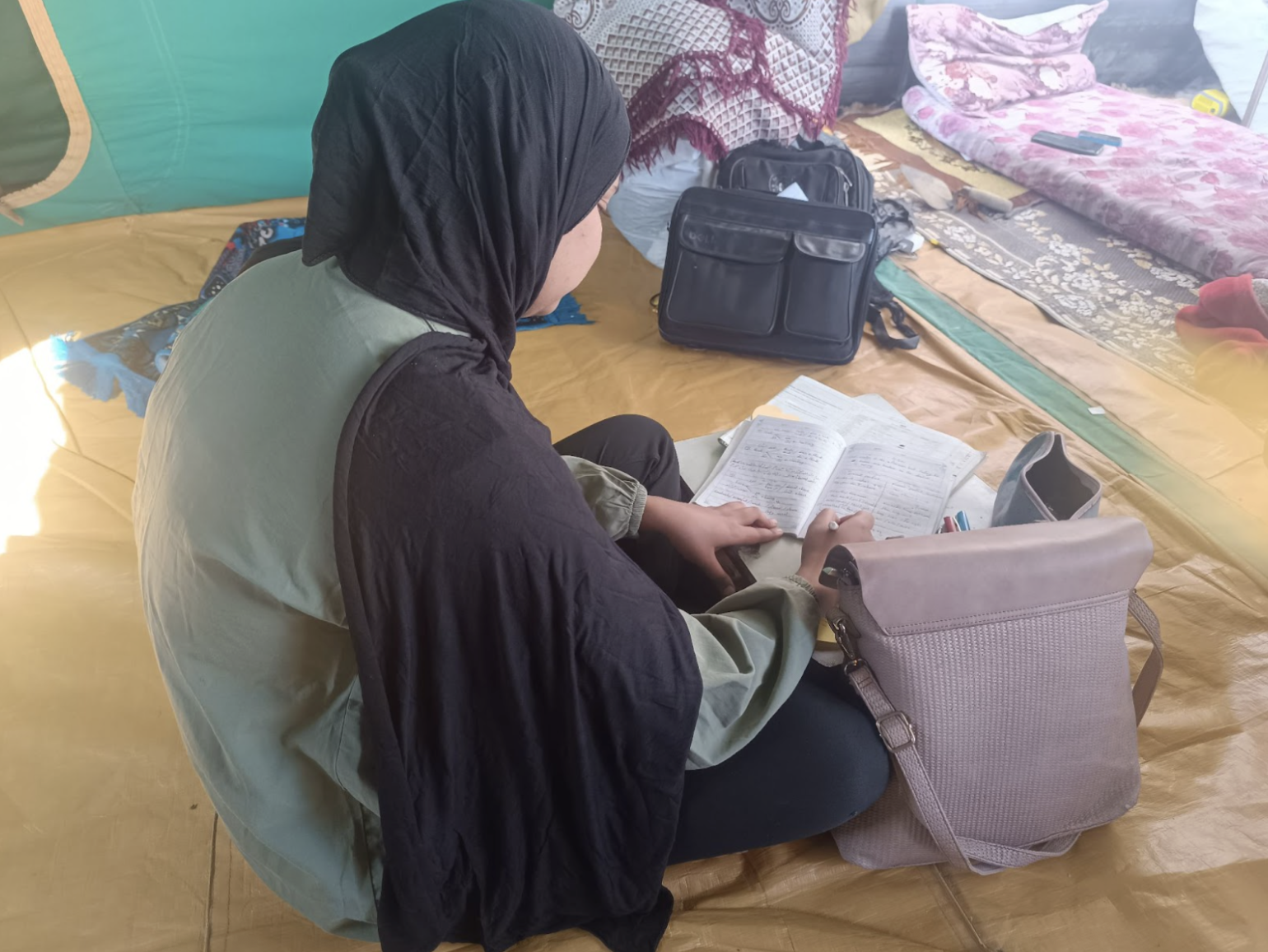Taking the Tawjihi exam under Israeli bombardment
Abir Qarmout, 18, studying in her tent in Northwest Gaza on May 24, 2025. Qarmout was one of 24,500 students who took the Tawjihi exam this year. Photo courtesy of the author.
November 18, 2025 — When the Tawjihi examinations were announced in Gaza this year, 18-year-old Abir Qarmout had nothing left from her previous life: no house, schoolbooks or a study desk.
But she was determined to take the exam. She studied in a tiny tent near the Egyptian Towers, surrounded by the constant buzz of drones.
Tawjihi Day marks the day when high school students across Palestine receive their results on the exam that determines their eligibility for university. Before the genocide, it was a national celebration in Gaza and the West Bank. Streets were filled with fireworks, sweets, and songs as students and their families celebrated.
Since 2023, about 90% of educational institutions have been destroyed by Israel, and over 20,000 students killed.
Abir was among the 24,500 students who took the exams online under extraordinary circumstances: bombings, hunger, displacement, power outages, and weak internet connection.
Amjad Barham, the Palestinian Minister of Education and Higher Education, said that the Tawjihi exams in Gaza this year was “a victory for the right of Gaza’s students to education, amid destruction, displacement, and hunger” and that it “symbolizes Gaza’s will to live and rebuild after two years of bombardment.”
"It wasn't easy," Abir told Palestine Nexus. "But I kept telling myself: this is my chance to start again.”
When the Tawjihi results were announced on October 14 for the first time since 2023, joy returned quietly in Gaza’s rubble and tents.
Abir, a student at Al-Kuwait Secondary School for Girls, was waiting for the announcement, checking her phone anxiously every few minutes. When the results finally appeared, she looked at her score: 88%. She screamed out of joy. Her parents cried. For the first time in months, laughter filled the tent.
Abir's Path to 88%
Following the January 2025 ceasefire, the Ministry of Education announced the Tawjihi exams would be held in June. But the ceasefire only lasted 42 days, and the bombings resumed in mid-March, and the exams were cancelled. When the announcement was made, Abir was prepared to take her exams. But, when the attacks resumed, her home was bombed, and her books vanished under debris. Paper and pen became luxuries.
"I used to study in my room with colored pens and sticky notes," she said. "Now, I write on scraps of paper from aid boxes.”
Even then, she continued studying, hopeful that one day she would be able to take the exams that would determine her future.
"I studied using my phone's dim light," she said. "Sometimes I memorized lessons in the dark. Food was scarce. I felt weak, but I kept reminding myself: no pain, no gain."
Her mother held the flashlight while she rewrote, and her father scoured the markets for a pencil or a few clean sheets. "They believed in me more than I believed in myself,” she said.
Often, she had to pause mid-lesson as bombs dropped nearby. "Sometimes I studied while the planes circled above," she added. "I tried to ignore them and keep my mind on the exam."
In September, after months of delay, the Education Ministry announced that the exams will finally take place. Students registered through the online platform, which allowed them to take their exams in phases amid disrupted schooling.
When she heard the exams would finally take place, Abir felt both anxious and excited. “It meant we still had a future,” she said. “Even in the worst times, Gaza’s students could rise again.”
On the day of her Science Culture exam, an airstrike hit near the Egyptian Towers area. She fled with her family to Nuseirat, dodging gunfire. Despite the displacement, Abir managed to complete her Science Culture exam in the new location the next day. The following morning, she sat inside a tent and began her Islamic Education exam. “I told myself I survived worse. I can do this.” After nine days of online tests, she completed her final exam on September 15.
The Results
On October 14, days after the ceasefire was announced, Abir sat in the small tent in Nuseirat where her family had temporarily shelteted, anxiously awaiting the exam results. Most of her close relatives were gathered around her, their eyes fixed on the small screen of her phone.
At around 1pm, when she entered her ID and saw the score, Abir screamed out of joy, filling every corner of the tent. She hugged her parents, tears streaming down her father’s face. “I can’t believe I did it!,” Abir said, smiling through her tears. “After everything we’ve been through, I really succeeded. This result is not just a number, it’s proof that hope is still alive, even in the heart of Gaza.”
“She studied through the bombing, using only her phone light. She never gave up,” her father, Abdul Karim said. “I thought happiness died with the war, but it returned with my daughter’s smile,” her mother, Hana, said, her voice breaking.
Abir now dreams of studying interior design at Al-Aqsa University to build Gaza back. “I want to help rebuild destroyed homes. Even a tent deserves beauty,” she said. “My vision is to restore not just the houses, but hope. Even in the smallest spaces, like temporary shelters, I want people to feel dignity and comfort. I want every home to tell a story of resilience.”
Subscribe to the Palestine Nexus Newsletter:


